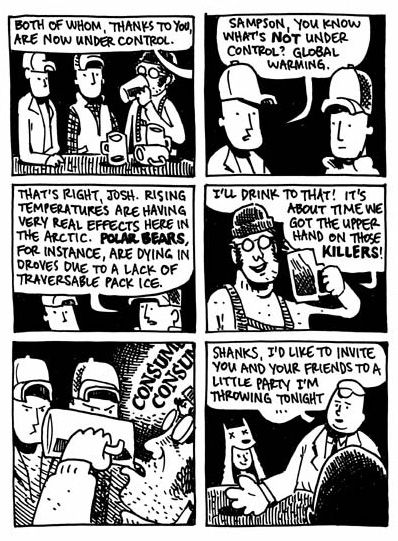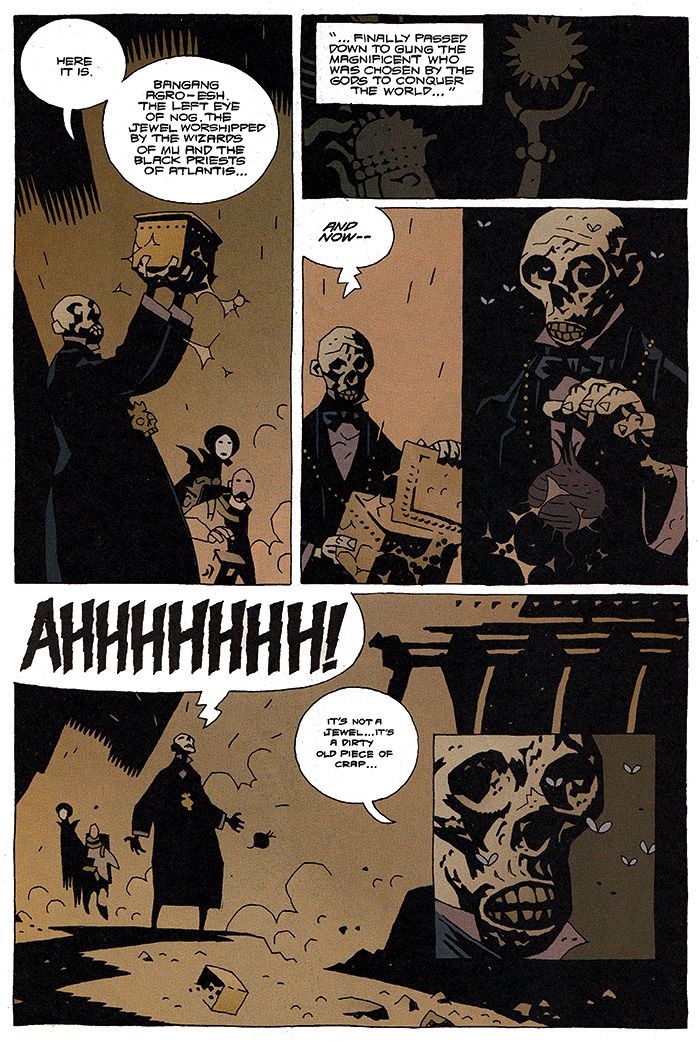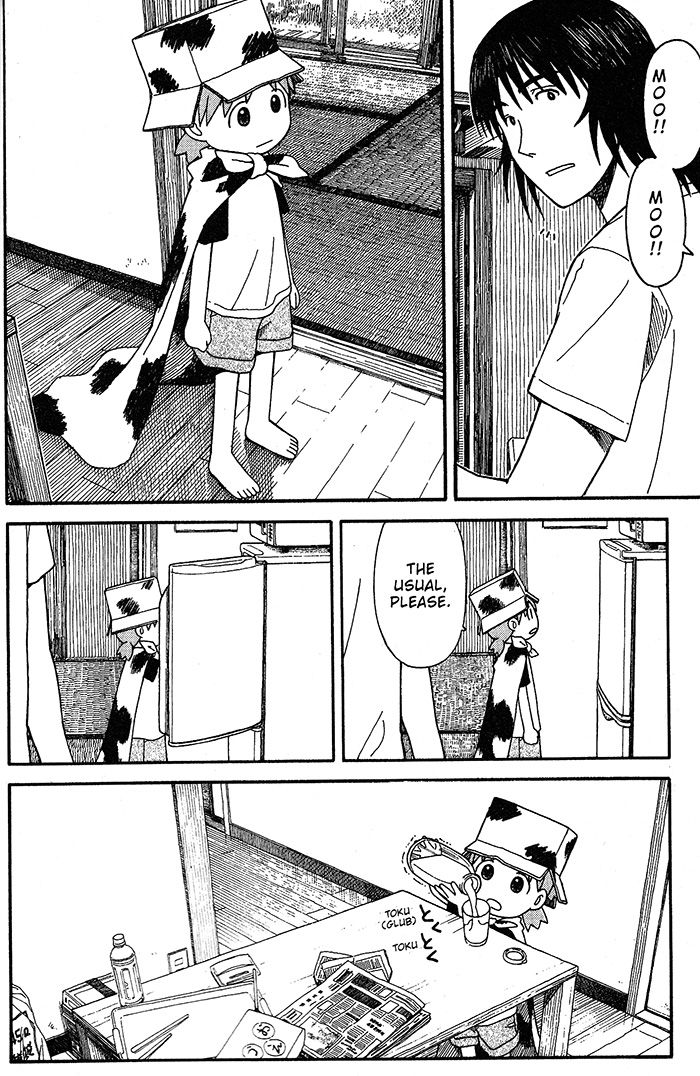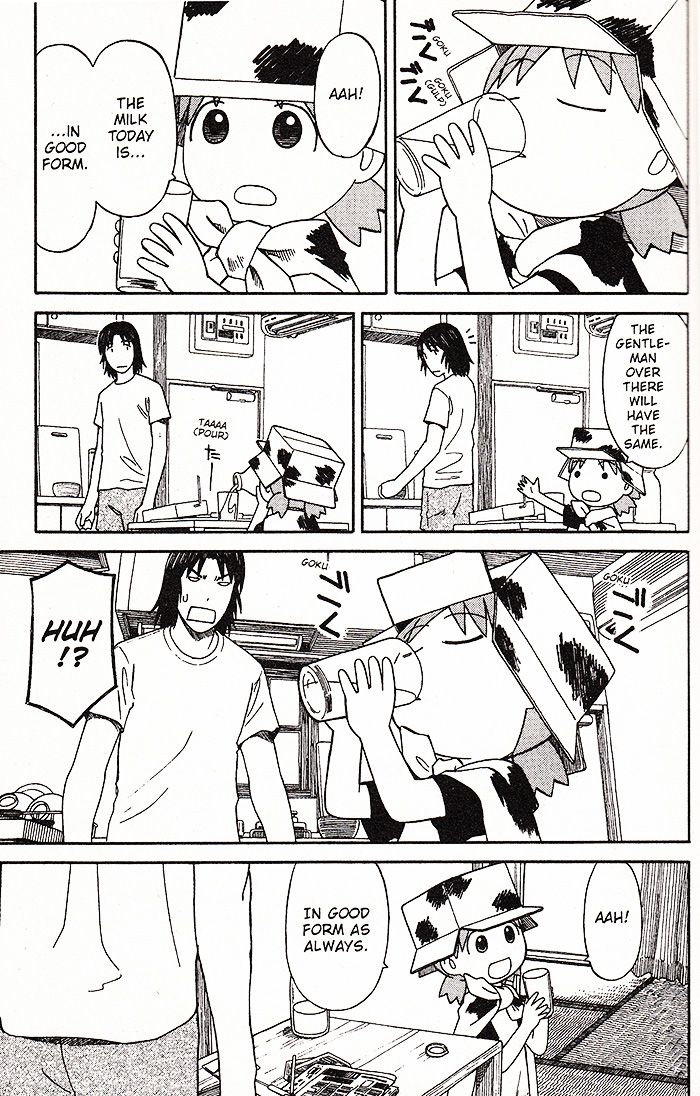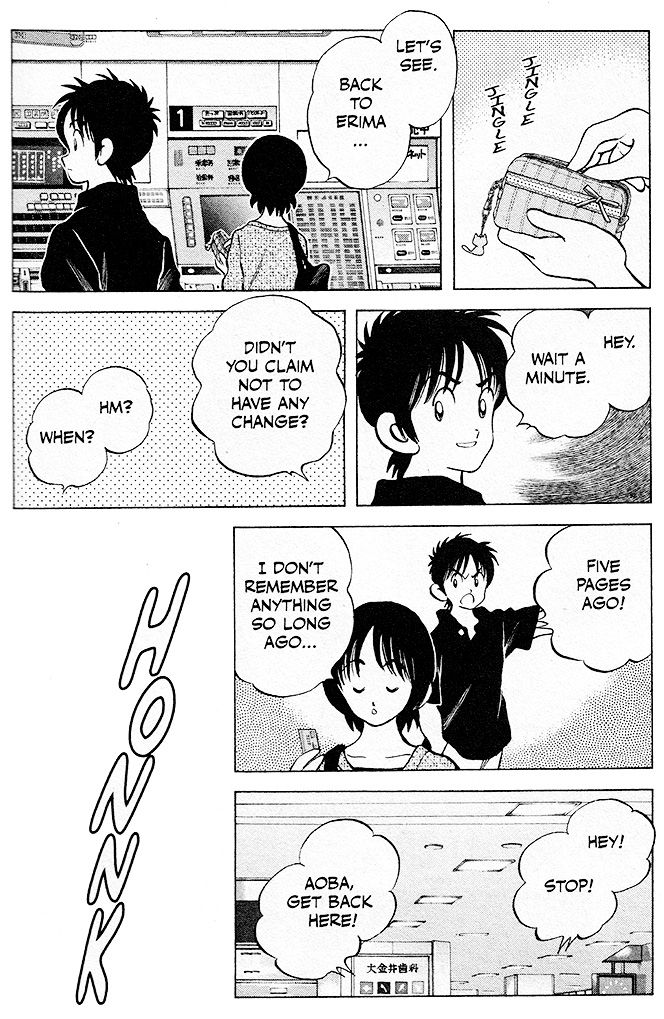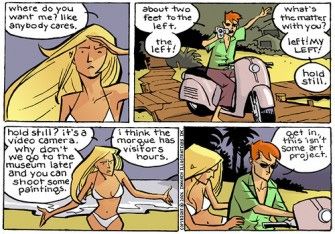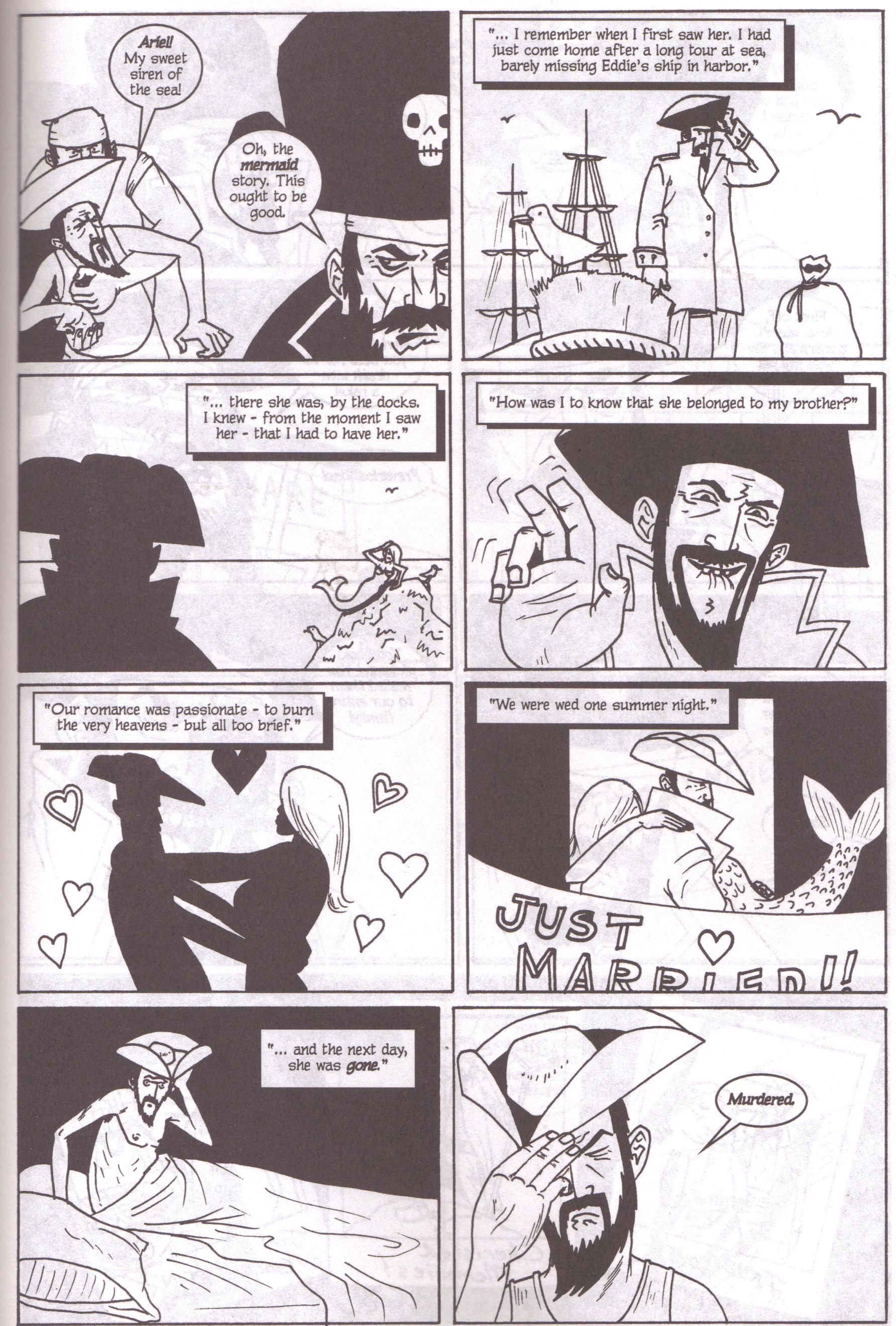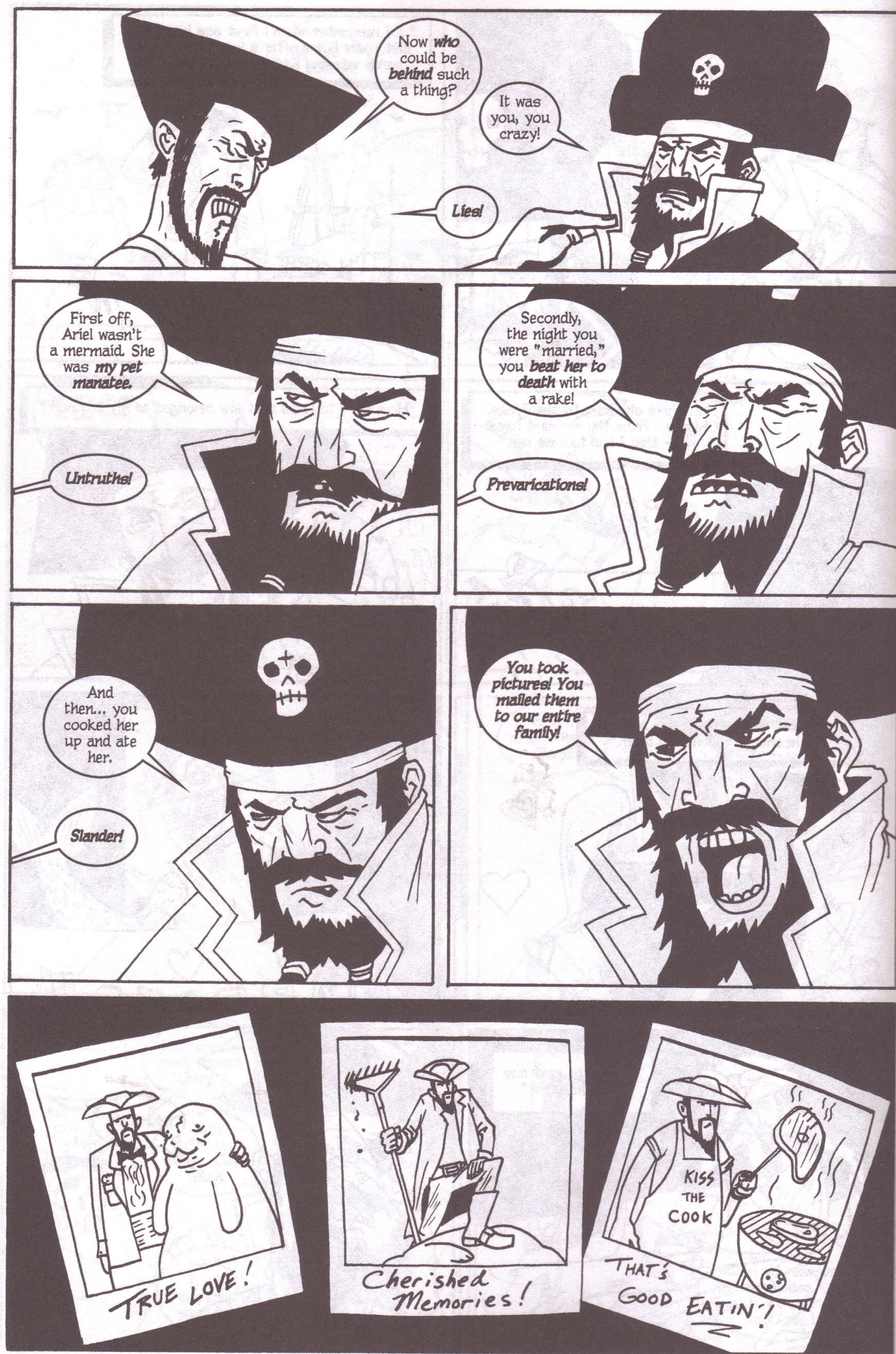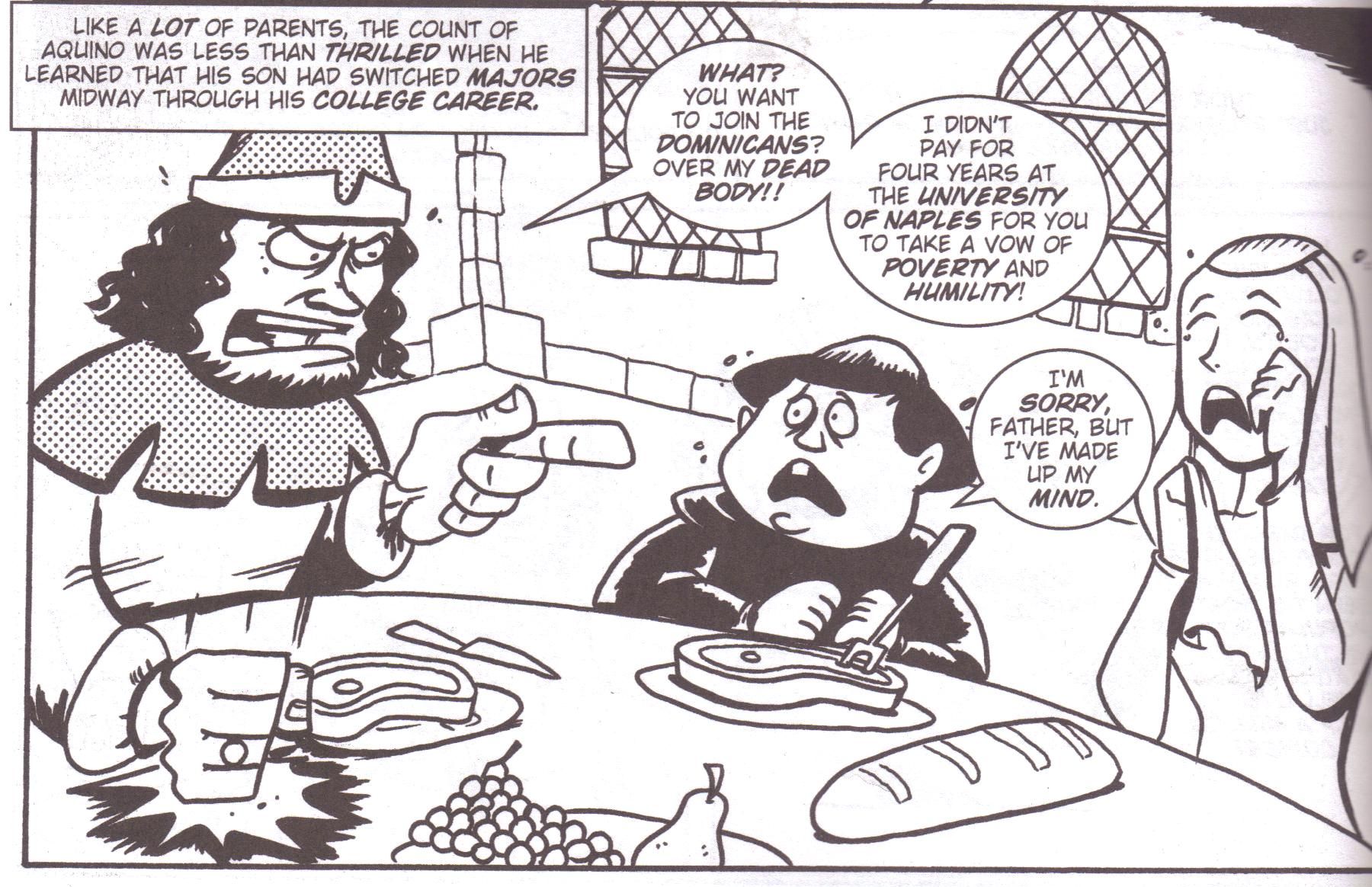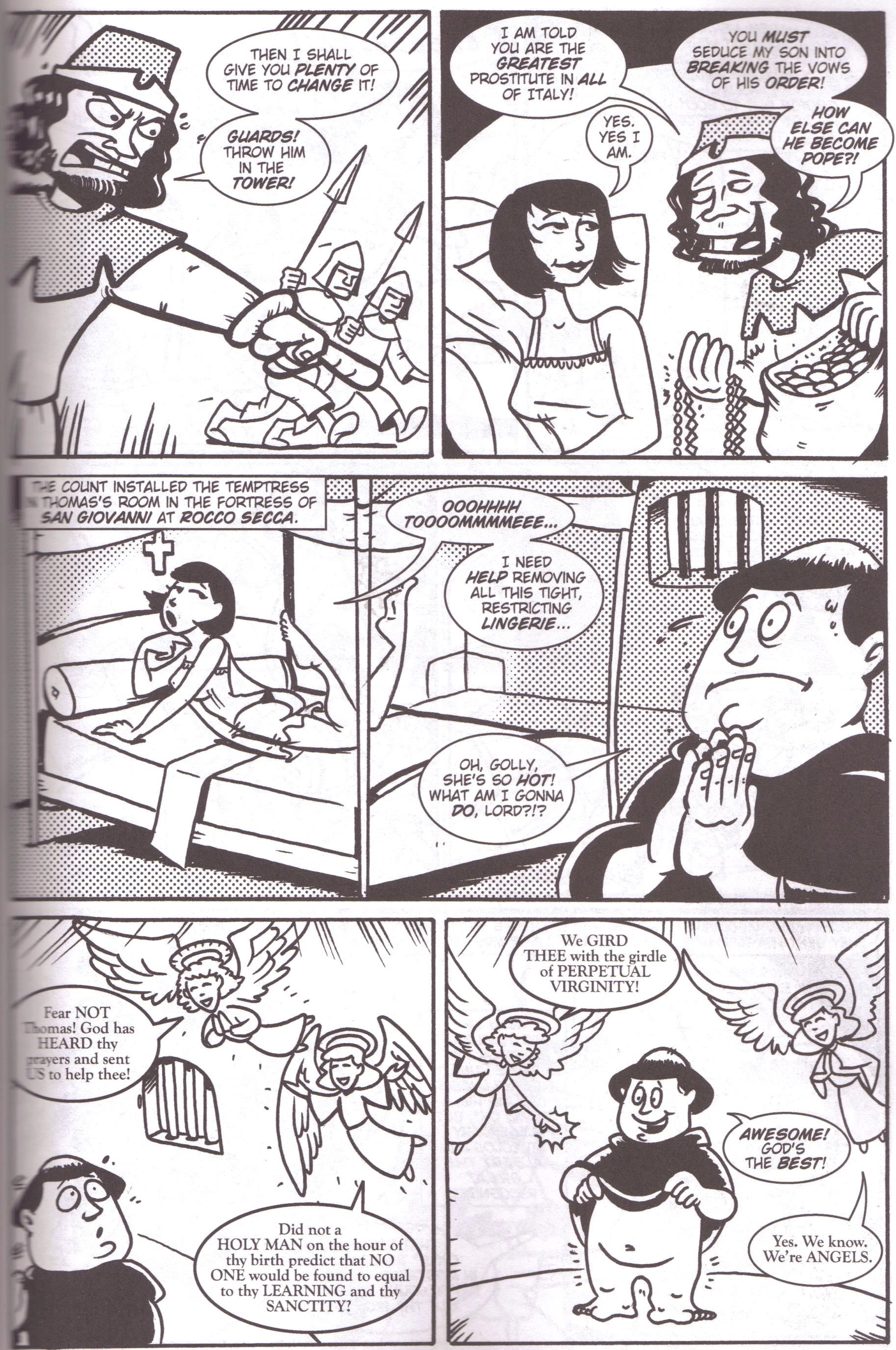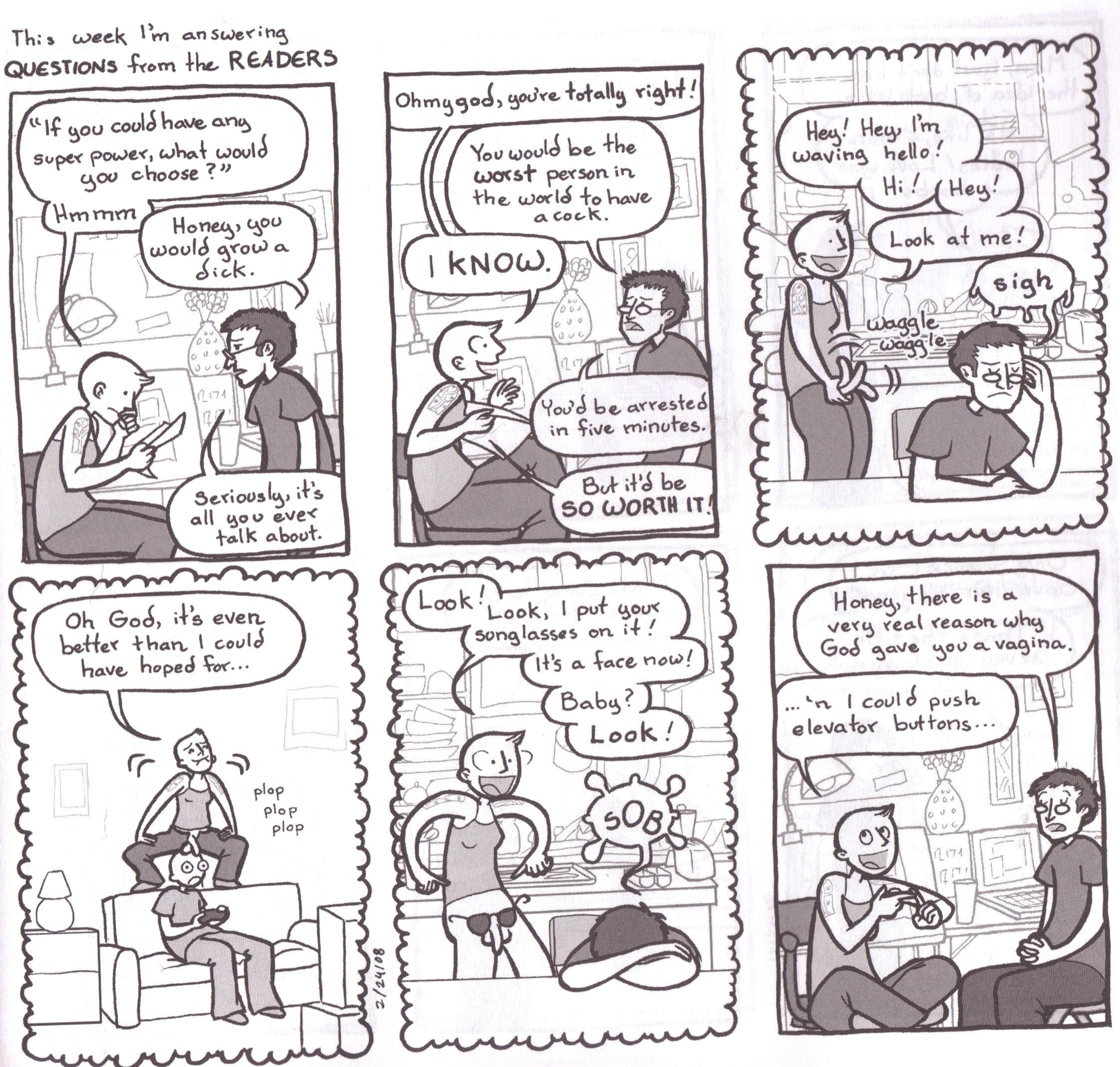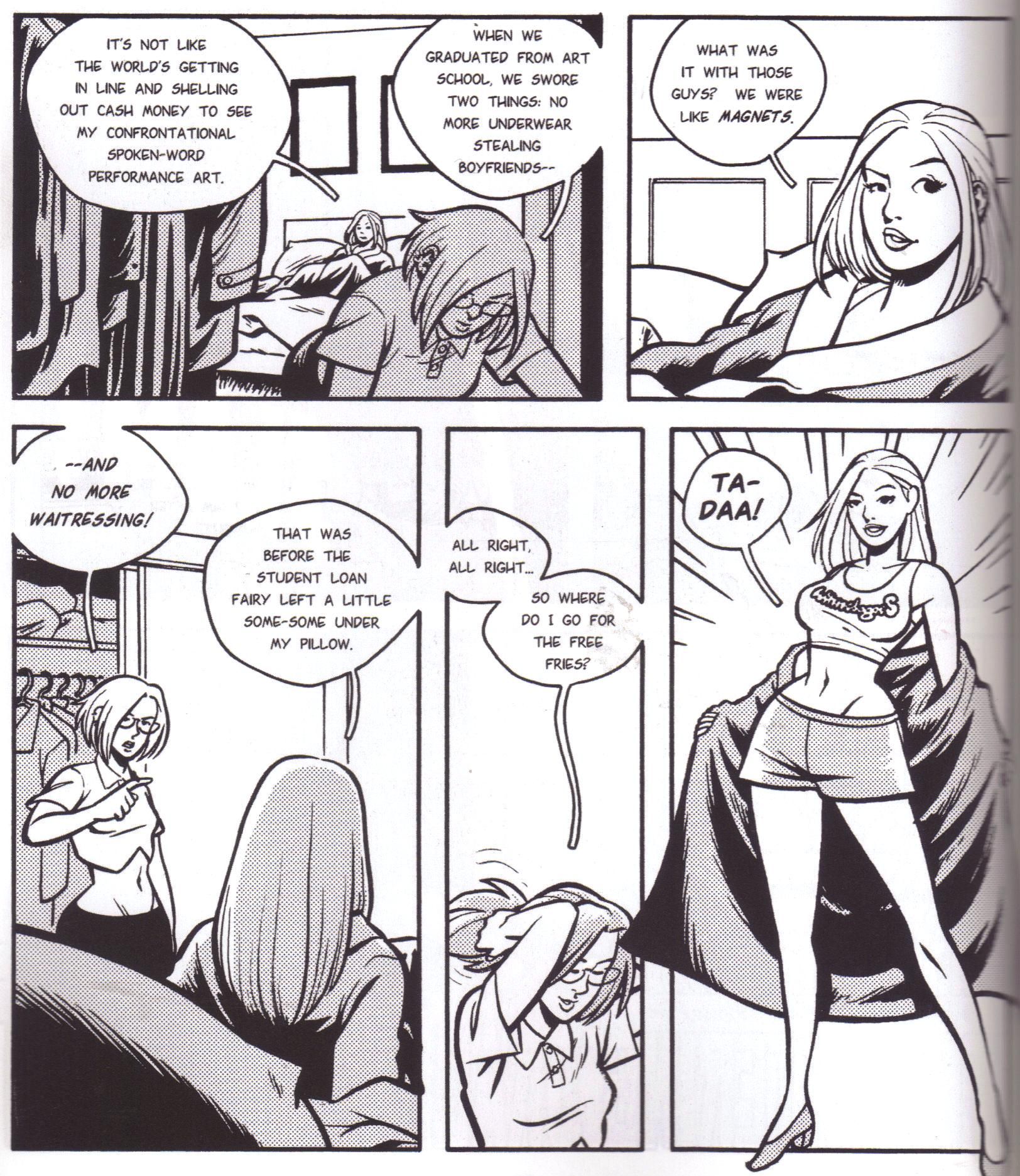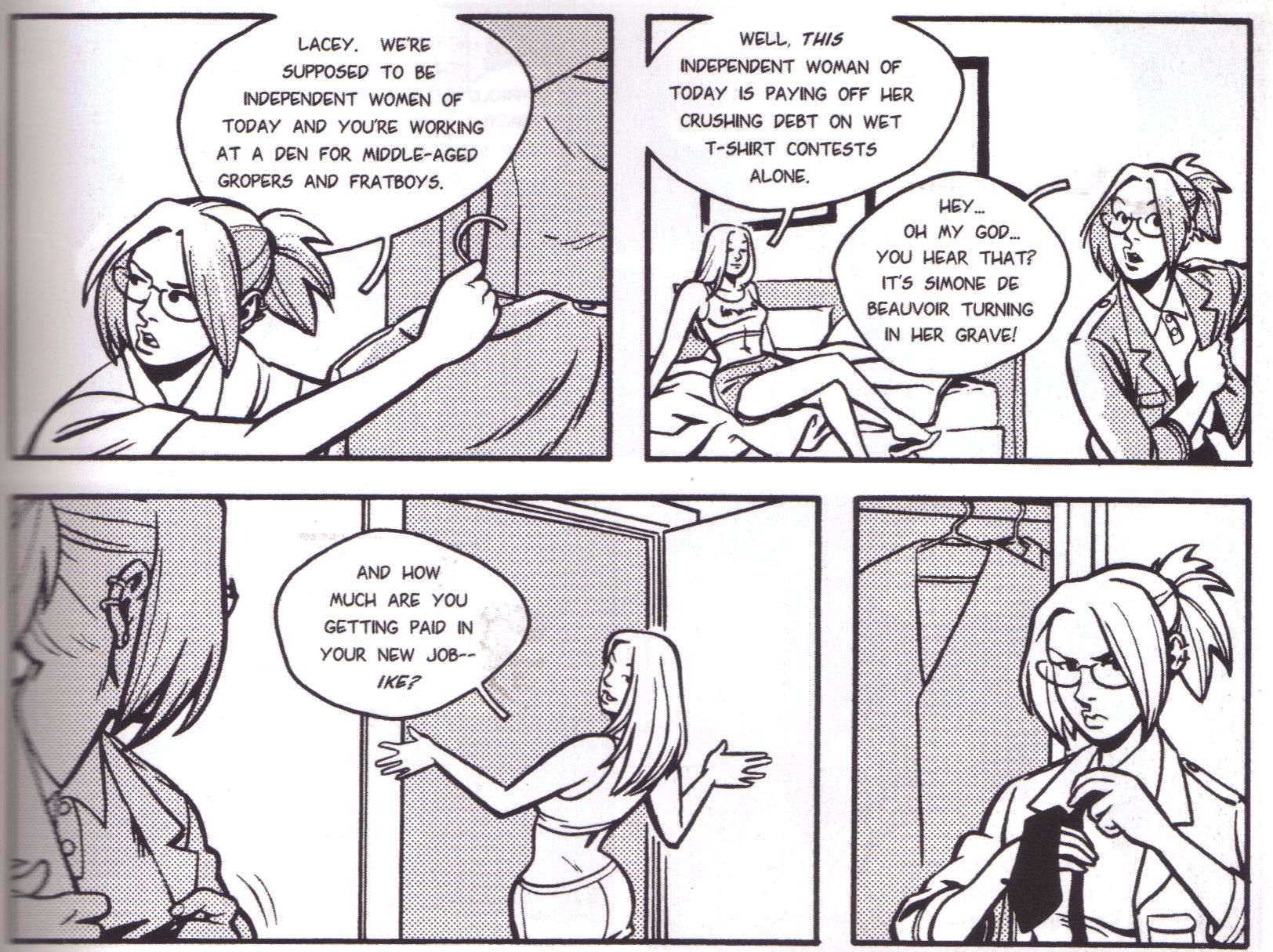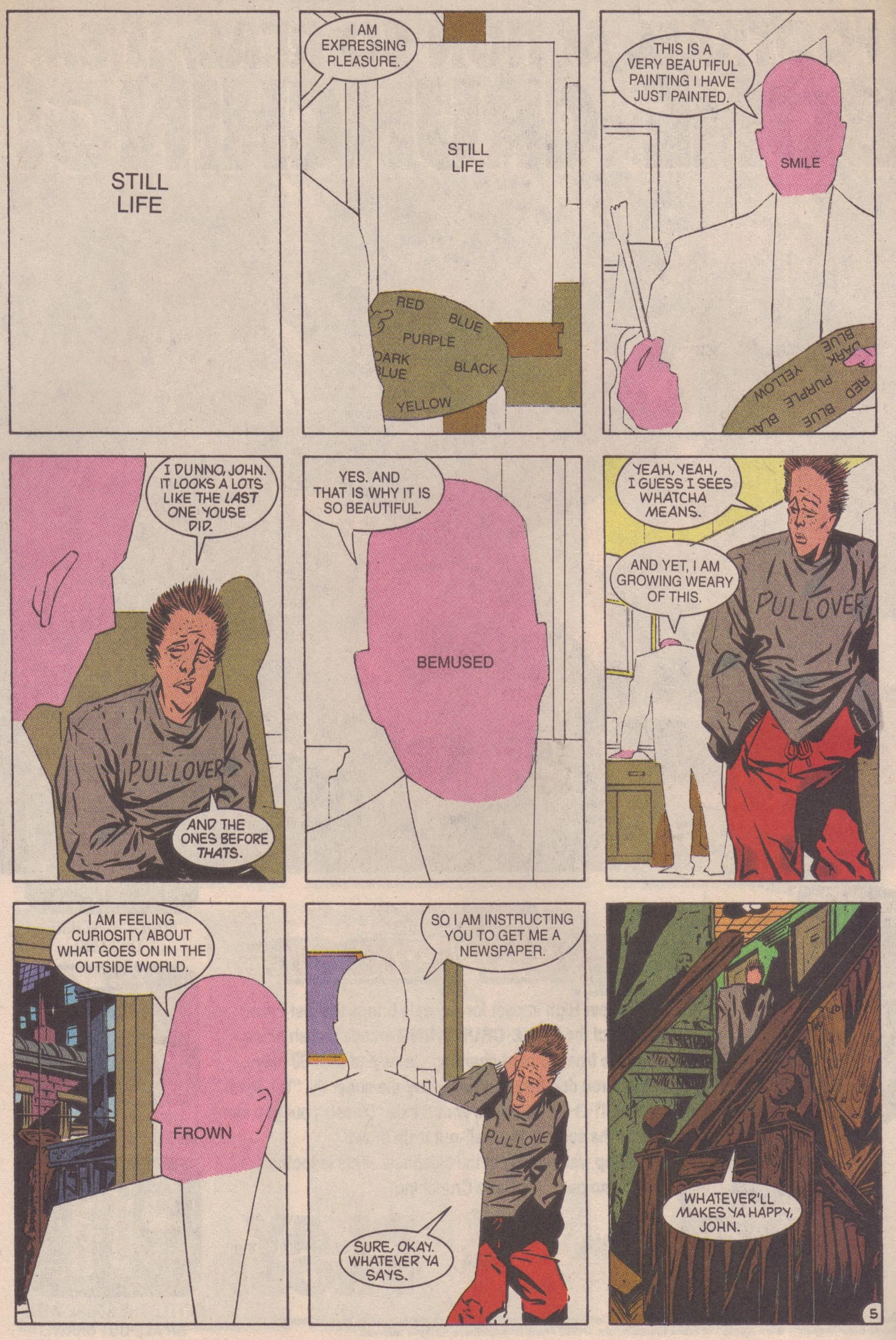A while back, Famed Reviewer Seth T. Hahne and I had a Twitter conversation about the funniest comics we've ever read. Well, that's just a post waiting to happen, so I asked him to send me a list of his five funniest, and I would do my five funniest, and voila! something we can all argue about! Sounds good, don't it?
One thing Seth and I agreed on was that we'd keep it confined to "narrative" comics, so gag strips were eliminated. We could both easily come up with very funny comic strips, like The Perry Bible Fellowship, Dinosaur Comics, Wondermark, or any number of other ones around the web, or even old favorites like Bloom County (still my favorite newspaper strip ever) and The Far Side. I was already planning on ignoring newspaper strips - yes, some of them have narrative arcs, but to me, they're a different animal than comic books. You may disagree. But with that caveat in place, we were off! First up: Seth's choices!
**********
With the comical subjectiveness by which we judge what is humourous from what is not, it may be best to lead off with some credentials. Not in order to establish me as any kind of authority on what is or isn't funny. That would be ruinous. More just to give you a metric by which to dismiss my choices from the outset - or just maybe to go, Hey, me and this kid like the same things so maybe his list won't completely suck.
So then, here are the first ten movies I think of when I think Movies That I Think Are Funny:
Fear and Loathing in Las Vegas
Monty Python and the Holy Grail
These are the kinds of comic stories that make me happy inside, even if they might not make me laugh. That'll give you a ground floor evaluation of what I find funny. And with that, my own Top 5 Funny Comics:
1. Far Arden/Crater XV by Kevin Cannon
Originally conceived as an experiment expanding on the 24-hour comic concept, Cannon forged Far Arden from a crucible of too, too many 24-hour pulls. At first I thought it possible that the book's manic rate of production might have been the source of its delightful humour. Then came its sequel, Crater XV, through which Cannon made clear that an actually sensible production schedule would do nothing to diminish the funny in his books.
Both books are haunted by the spectre of doom. From the start, Far Arden delivers its hero and his friends into dire straits and doesn't let up. Crater XV doesn't veer from course either, and protagonist Army Shanks is living as much a bummer of a life as he was in the prior volume. And yet for all that, these books are the two funniest narrative comics I've ever had the pleasure to spend time with. It's kind of like if you told the story of Logan from the X-Men, but told it in a raucous and hilarious fashion and made everybody say funny things and reveled in the best comicbook onomatopoeias ever conceived.
This page includes representative funniness and a lesser onomatopoeia:
2. The Amazing Screw-On Head by Mike Mignola and Dave Stewart
I had an inkling of Mike Mignola's sense of humour with the release of his delicious Hellboy-as-a-child story about pancakes (my wife and I will still announce to each other in appropriate circumstances, "He has tasted the pancake!"), but I wasn't remotely prepared for the pure madcap absurdity of The Amazing Screw-On Head. Mignola employs bizarre interactions, wacky characters, and pregnant pauses to brilliant effect. Part of the wonder of the humour is the surprise - and despite the fact that you know you're reading this zany, zany book, Mignola's delectable little moments still leap out from behind the curtains, startling in their ingenuity.
And of course, there's always the combined visual ferocity of of Mignola and Stewart. Which is just a lovely thing.
3. Yotsuba&! by Kiyohiko Azuma
Azuma's follow-up to his popular gag-strip highschool narrative Azumanga Daioh capitalizes on a different kind of humour. Yotsuba&! trades on the comedy of life rather than on wit and slapstick. Yotsuba is a five-year-old girl who finds the complete foreignness of her new environment invigourating.
The humour of the book derives from Yotsuba's naïveté. Whether encountering air-conditioning or a swingset for the first time, her expression of wonder and mischievous delight are a joy. I began reading the book before I got married (before I'd even met my wife actually) and now that my daughter has just turned four, I'm weekly (if not daily) encountering Yotsuba-esque reactions in her. When I first encountered the book in 2005, I loved it but assumed that Azuma's depiction of the Yotsuba was just plain madcap. Now I know better and find the book even more endearing. Just as funny, but more endearing.
These two pages read right to left:
Oh, and a note: despite the fact that Yen Press's translations may be more accurate to the source language (and I'm grateful that the publisher took on the series after ADV dropped the ball), ADV's earlier work translating the first five volumes actually reads more smoothly and is, hence, funnier.
4. Cross Game by Mitsuro Adachi
While not foundationally a comedy, Adachi's exploration of familial fidelity and camaraderie in the face of jaw-dropping loss counterposes its serious and sentimental moments with a good couple fistfuls of humourous ones. Cross Game didn't immediately spring to mind when compiling these selections, but at last I remembered sitting in bed night after night reading through these eight volumes while my wife went through her preparatory bed routine in the adjoining bathroom. What struck me most from the memory was her stopping to call out every several minutes to demand, "What's so funny?" These were books that caused audible outbursts of joy from me. That's so much a rarity. I think Dinosaur Comics is maybe one of the funniest things ever and it's entirely possible that I've never laughed out loud while reading it. I'm just not a laugh-out-loud kind of person. At best, a single, low "Heh" will be the sign that I find a joke astonishingly funny. And yet Cross Game had me exulting with Hah!s and Eh heh hehehehehs. It might have been the jumps between somber, sweet, and silly that primed me for those reactions - in any case, masterfully done.
While Cross Game does traffic in gags and the repetition of in-jokes (many pitting the creator against his editors), the bits with the best payoff are developed over the course of pages and sometime even across chapters. Adachi pushes his readers to pay attention to what they're reading and rewards their diligence with both humour and poignance.
This page reads right to left:
5. Never As Bad As You Think by Kathryn and Stuart Immonen
Several years back, an interest in Stuart Immonen turned me on to a side project put together by him and his wife, Kathryn. Never As Bad As You Think developed as a participation in Illustration Friday, an exercise in which a word is proposed and artists created a drawing based on that word (as I write this, the week's word is Equality). For Never As Bad As You Think, Kathryn Immonen would roll the week's word around in her head, jot down a script based on the word on a 3"x 5" post-it, and hand it off to Stuart Immonen, who would then draw a vibrant several panels and the week's comic would be done. Each week's comic would flow out of the prior one, and while characters and settings would cycle through with some alacrity, the fifty-two comics really do flow pretty well from start to finish.
Never As Bad As You Think's humour is almost entirely reliant on Kathryn Immonen's verbal wit (while the art is lively and fun, it mostly works to provide a safe harbour for the absurdities of the script). I haven't read Kathryn Immonen's superhero books, but a less-zany reflection of the style she uses in Never As Bad As You Think can be found in the funny-though-not-quite-as-funny Moving Pictures, a book that feels kin to the repartee found in 1940s Hollywood comedies. Lots of wordplay, lots of wit, lots of conversations that would probably never unfold between two people who weren't being mediated by a script: that's Moving Pictures. Now magnify that by ten and you've got a taste for Never As Bad As You Think.
It kills me that Never As Bad As You Think is out of print.
Compiling this list was ridiculously difficult. I had two sure entries, Far Arden (and its sequel) and Screw-On Head. Those were unshakable for me. Everything else was up in the air. In my head before I began, Nextwave was a shoo-in. I remembered laughing a lot. Or at least I thought I did. Really, I mostly remembered Stuart Immonen's fantastic art. So I reread it and found myself completely bowled over (again) by the illustrations but only mildly chuckling (at best) at the funny things that characters did or said. Honestly, it felt like it tried too hard. Like those What The -- ?! books I adored back in the '80s.
A lot of books ended up in this middleground category for me. Books that were definitely funny, but maybe not that funny. Like maybe how I remember The Wedding Singer. Pleasant diversion and good entertainment, but not top-notch funny. I cycled through a lot of books that all ended up in this kind of catch-all. Street Angel, The Goon, Atomic Robo, Chew, The Umbrella Academy. I even pulled out the comedic staple from my youth, seventy-or-so issues of Groo the Wanderer, to see if the Aragonés/Evanier collaboration could make the cut. They were all still completely worthwhile books, but they were also all not quite as funny as I remembered them.
Which is fine. They don't need to be. I just love them for different reasons now. Comedy is weird. It's subjective and our experience of it is deeply molded by our current mood, circumstances, and place in life. I'm a bit afraid of rewatching Holy Grail or Airplane! again. After all, it's been several years and what if, like these books, I only end up finding them merely amusing. That would be as devastating as when I saw Ren & Stimpy again after fifteen years and didn't laugh. Comedy is serious business.
**********
Okay, now here's mine.
1. Scurvy Dogs by Andrew Boyd and Ryan Yount
This is the no-brainer. Ever since I first read Scurvy Dogs, back in 2005 or so, it's been one of my favorite comics and by far the funniest one I've ever read. Boyd and Yount's tale of pirates in the modern day is a bit riddled with pop-culture references, which is probably its only weakness, but the creators hit with them far more than they miss, and their comic timing is superb. The most famous bit is probably the first one, where the captain tells his date a story about his crew coming across a ship full of Portuguese lepers and robbing them blind, which includes the line "Shillings in the belly. The oldest Portuguese leper trick in the book," but the entire short story is hilarious, especially the "shock" ending. But Boyd and Yount fire on all cylinders in most of the stories - in the second half of issue #1, the pirates have to get jobs, in issue #2 they fight monkeys, in issues #3 and 4 they fight hoboes, and in issue #5 they fight ... Twiki from Buck Rogers? Plus, they meet Vampirella. The plots, obviously, don't really matter - it's all about the jokes and the way they're delivered. The Speak-and-Say Lie Detector, the Anson Williams single, the various tribute bands (including Lita Fjord), Rod Stewart in the rocks - I know so many of the jokes by heart (as I've read this so often), but I still laugh when they arrive, and I even laugh before they arrive because I know they're coming! Scurvy Dogs is one of those comics that I recommend to anyone if they ask - I don't care what kind of comics you usually read or if you even like comics. You'll like Scurvy Dogs, I swear!
2. Action Philosophers! by Fred van Lente and Ryan Dunlavey
There are a few comics below this that might make me laugh harder, but Action Philosophers! is not only very funny, it's amazing how van Lente and Dunlavey can squeeze so much information into the comics and still make it funny. Van Lente uses a lot of pop culture and even superhero tropes to boil down philosophers' teachings into manageable bites, and Dunlavey illustrates it all in a manic, detailed, and fascinating style, as he's able to do all sorts of things to illustrate some of the more complex philosophical ideas in the universe. Obviously, van Lente and Dunlavey can't be too in-depth, but you can learn a lot about the basic building blocks of dozens of philosophers from this book, and it's funny as hell, too. They cover it all, too - ancient philosophy (Greek and Chinese), medieval European philosophy, Renaissance and Enlightenment philosophy, and contemporary philosophy. The creators try a lot of different ways to illuminate all of the philosophers' ideas, including a parody of "Peanuts" when they do John Stuart Mill and a parody of "The Family Circus" when Michel Foucault shows up. It's brilliantly done, and it's very, very funny.
3. DAR! by Erika Moen
This is very close to breaking the "no gag strip" rule, but as it's mostly Moen's autobiography, the gags often do help tell the story of Moen's life during the time she was doing this strip. I got the two volumes of DAR! at San Diego in 2010, and Moen immediately became one of my two favorite people in comics (Dylan Meconis, Moen's best pal, is the other one). DAR! is fantastically filthy, full of sex, dick, and fart jokes, and it's relentlessly hilarious. The great thing about DAR! is that Moen is also navigating the world of new marriage, the world of sexual identity (she called herself a lesbian until she met her husband, and she still likes girls but is in love with a specific person who happens to be a man), and the world of being a comics creator, all of which is fascinating. She weaves these threads together into a terrific and very funny journey, one that might not be what everyone experiences but which is still very relateable. DAR! is also utterly fearless, and it's impressive that Moen puts so much of herself out there (I've spoken to Moen about this, and she has said she doesn't think she'd be so fearless these days, but it does make DAR! far more intimate than you might expect). Obviously, if you're offended by sex and fart jokes, you might not like DAR!, but the way Moen tells the story is so charming that you won't be able to resist!
4. The Middleman by Javier Grillo-Marxuach and Les McClaine
Like Scurvy Dogs, this is another comic that uses pop culture very well so that it strengthens the humor instead of detracting from it. Grillo-Marxuach uses the "secret agent" trope to introduce the Middleman, who fights evil so you don't have to, and his new protégé, Wendy Watson, who provides the sarcastic take-downs to the Middleman's rigidly do-gooder demeanor. Grillo-Marxuach's use of popular clichés of comics fiction (monkeys, Mexican wrestlers) shouldn't work, but thanks to some razor-sharp dialogue and wonderful timing, he pulls it off. He manages to make the Middleman amusing in his own right even though he often doesn't understand why he's the butt of the joke, and the fact that he's completely decent, great at his job, and sees Wendy as his little sister makes him a great straight man. Wendy and her roommate, Lacey, are wonderful together, dropping amusing bon mots that zip right past you and make you double-take. McClaine's wonderfully expressive art helps greatly, as Grillo-Marxuach's humor does often depend on the right body language or facial expression, all of which McClaine exceeds at. The television show based on the comic is very funny, too, and you should check both the comic and the show out, stat!
5. The Heckler by Keith Giffen, Mary Bierbaum, and Tom Bierbaum
As always with lists, the final spot is the hardest. I really had a bunch of possibilities for a list of 5, and this makes the cut just slightly in front of John Byrne's She-Hulk and Grumpus McBearderson and Alan Davis's D.R. and Quinch. The Heckler is just a bit more insane, and I like the comic just a bit better than those others, so while all are very funny, this makes the list by a nose. Giffen and the Bierbaums introduce us to Stu Mosely, who somehow is super-strong and super-tough when he becomes the Heckler. He roams the streets of Delta City doing good, and what makes the book so brilliant is that Delta City is a crazy-quilt of marvelously funny stores (Just Dickies, Styrofoam Emporium, Sproing & Son: Your Trampoline Source since 1989, and The Wonderful World of Runny Cheeses are just a few), street names (Staccato Street and Anthrax Boulevard, among others), and bizarre neighborhoods (Droolers' Park and Little Phnom Penh, for instance). It also has villains as oddball as the Heckler (Boss Glitter, C'est Hay, the Flying Buttress) whose plans never seem to cause too many problems. What makes The Heckler so wonderful is that Giffen is celebrating the weird, so that the villains who cause the most problems are the ones who make things less weird. Issue #2, of course, is the most famous one, in which John Doe, the Generic Man, threatens to make everything, well, generic. The Bierbaums provide sparkling dialogue, and Giffen's artwork is full-on craziness. It only lasted 6 issues, but what issues they were!
As Seth mentioned, compiling a list is always hard, especially once you get past the no-brainers (for me, that was the first three). As I mentioned, She-Hulk and D.R. and Quinch could have easily been on here, as well as Nextwave and the Giffen/DeMatteis Justice League. There are a lot of funny comics out there!
**********
So that's two lists of funny comics. I'd like to thank Seth for joining in, because it was fun to see what he had on his list and how different it was (I've read the three non-manga books he has on his list, and while I agree they're funny, I didn't immediately think of them when I thought of funny comics). Let us know how much you agree or disagree, and if you want to sound off with your own, feel free! We're all friends here!


